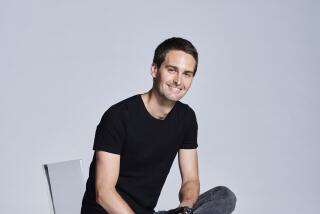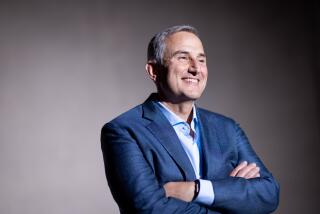Facebook’s Chris Cox: A very likable pitchman
SAN FRANCISCO — Facebook has a star, and it’s not Mark Zuckerberg.
Chris Cox, the lesser-known 29-year-old Facebook executive, has been stealing the roadshow from the social network’s gawky chief executive since his breakout role in a slick video shown to investors and posted on the Web this week.
The video exalting Facebook ahead of its initial public stock offering didn’t get rave reviews from buttoned-up financiers who had to cool their heels for half an hour before they could meet top executives. But Cox’s performance did.
Facebook is betting its new pitchman can drum up interest in the IPO on Main Street despite weaker-than-expected demand from Wall Street investors concerned about tapering growth in the company’s advertising business.
“I didn’t know who he was. I just knew I wanted to be his friend,” Wedbush Securities analyst Michael Pachter said after watching the video, in which Cox in a casual long-sleeved shirt passionately pitches Facebook’s product and mission. “I couldn’t even tell you what he said. I just instantly liked him.”
Cox, Facebook’s vice president of product, has had that effect on people inside Facebook since he dropped out of a Stanford graduate program in 2005 to join the tiny start-up when it had fewer than 100 employees.
He has risen to the top ranks of the social networking giant, tackling some of its biggest challenges. He worked on News Feed, which fueled Facebook’s explosive growth. As a 25-year-old engineer, he was tapped to run human resources and set the tone for Facebook’s culture. He even coined the company’s mission: to make the world more open and connected.
In 2008 he became one of Facebook’s top executives charged with helping Zuckerberg carry out his vision for the products Facebook rolls out to its 900 million users. Cox oversees hundreds of engineers, designers and product managers.
He’s obsessed with making Facebook even more social, his co-workers say. He himself is probably the most social guy at Facebook, as well known on its Menlo Park, Calif., campus as Zuckerberg. He’s the first person new recruits meet.
Now Cox is taking on a far more public role as Facebook hits the final stretch before its IPO, traveling the country with Facebook Chief Operating Officer Sheryl Sandberg and Chief Financial Officer David Ebersman. He’s as comfortable slinging shares of Facebook as he is grooving on the keyboards in an Afrobeat band.
“Chris exemplifies the heart, soul and intellect that make Facebook the profoundly impactful company that it is today,” said former Facebook executive Dave Morin, who runs mobile social networking app maker Path.
Facebook declined to make Cox available for comment.
Cox was born in Atlanta and raised in the Chicago suburbs. His mom taught high school English and humanities, his dad was an actuary and an executive at a life insurance company. He learned to play piano and program computers at an early age. He was a math nerd and a jazz aficionado who devoured great works from the Greeks to Friedrich Nietzsche. He said he saw the world as a giant puzzle that he wanted to piece together.
Cox enrolled at Stanford in an interdisciplinary program that combined studies of artificial intelligence and cognitive science. He graduated in 2004 and then pursued graduate studies in natural language processing.
His roommate, Ezra Callahan, was an early Facebook employee who came home every day with a smile on his face, Cox said in a 2008 interview with The Times. Cox passed on working there at first; he didn’t think it was a serious enough endeavor. But a series of interviews with Facebook co-founder Dustin Moskovitz and former Chief Technology Officer Adam D’Angelo changed his mind. They got him to see Facebook through their eyes as a modern medium that made it possible for people to communicate effortlessly with one another.
His first job: Build News Feed. “People would click through profiles on Facebook looking for what’s new. It was amazing. We had this massive communications infrastructure, but we still couldn’t answer the question: ‘What’s going on?’ ” Cox recalled in 2008.
Nine months later, the first item popped up in his News Feed: His cohort Andrew Bosworth had uploaded a photo. Cox was thrilled. Users were not.
Cox said he felt what Igor Stravinsky must have when the premiere of his ballet “The Rite of Spring” triggered a riot.
“I had friends who I hadn’t talked to in years saying, ‘You just ruined something I really cherished. Please, please, please turn this off, Chris, I beg you,’ ” Cox recalled.
But Zuckerberg was not fazed, Cox said, and with some tweaks, News Feed became a runaway hit.
Next, Zuckerberg asked Cox to take on an unusual assignment for an engineer: running human resources to give Facebook an edge in Silicon Valley’s talent wars and codify Facebook’s hacker culture.
“One of Chris’ biggest skills is emotional intelligence. He’s just one of those rare people from an engineering background who excels at that,” Facebook engineer Mark Slee said in a 2008 interview.
Cox ascribes Facebook’s success to Marshall McLuhan’s theory that all new technology, from roads to the printing press, was built to fulfill the basic human desire to connect with others. With Zuckerberg, Cox formulated “social design,” the idea that people — who they are, what they do, what they care about, who their friends are — not software code, should shape new features and products.
“He has one of the best fundamental understandings of what Facebook is all about and what it is trying to do,” Slee said. “He gets the super zoomed out picture.”
Facebook has ruffled users by rolling out new designs and features. It has been frequently condemned for how it handles users’ personal information, and even had to reach a 20-year privacy settlement with the Federal Trade Commission.
Chris Kelly, Facebook’s former chief privacy officer, said Cox reined in efforts to push the envelope on privacy.
“He has made sure that users are not pushed to be more open than they are comfortable being,” Kelly said.
Facebook’s financial success rides on keeping its users glued to the service even as they shift their attention from personal computers to mobile devices, on which it’s tougher for Facebook to show them ads. The pressure will only intensify next week, when Facebook is slated to begin trading as a public company.
But Cox is known inside Facebook for keeping his cool, whether on stage at annual developer conferences or on keyboards in a packed Berkeley nightclub with Baba Ken and the Afro-Groove Connexion, a mix of Nigerian and American musicians.
“When I play music, it’s about connecting with people,” Cox said. “Music is like a deeper language. A lot of being a good musician is being a good communicator.”
More to Read
Inside the business of entertainment
The Wide Shot brings you news, analysis and insights on everything from streaming wars to production — and what it all means for the future.
You may occasionally receive promotional content from the Los Angeles Times.






